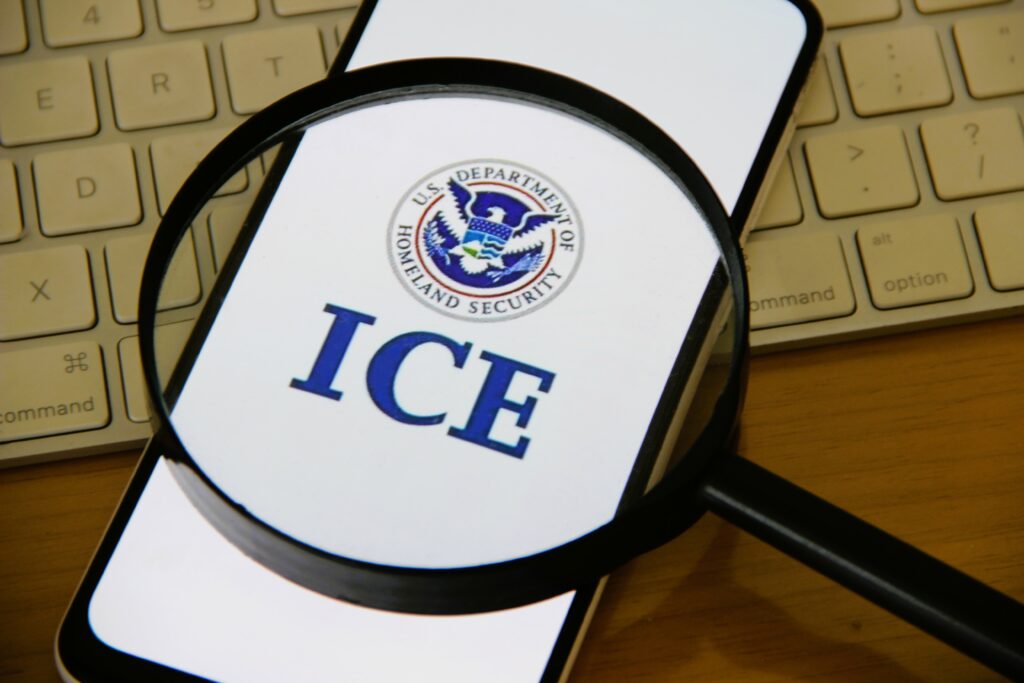
The Fourth Amendment of the United States Constitution protects everyone, regardless of immigration status, from unreasonable searches and seizures. This means that ICE is required to comply with these constitutional boundaries before entering your home or workplace. Here are a few things you should know:
Contents
Your Home:
The Fourth Amendment protects you from unreasonable searches of your home. This means that ICE cannot enter your home without proper authorization.
- Warrant Requirement. To lawfully enter your home, ICE officers must present a judicial warrant, signed by a judge. Administrative warrants which are issued by ICE officers do not allow for ICE to lawfully search your home.
- Do Not Open the Door: If ICE comes to your home, do not open the door before determining whether they have a lawful warrant. Instead, ask them to slide the warrant under the door or hold it up to a window so that you can read it. If it is not signed by a judge, you are not legally required to let them in.
- Remain Silent. You have the right to remain silent. If ICE asks about your immigration status or where you were born, you do not have to answer. You can say “I am exercising my right to remain silent.”
- Do Not Sign Anything. If ICE detains you, do not sign any documents without speaking to an attorney first. You may unknowingly waive your rights or agree to voluntary deportation.
Your Workplace:
ICE is permitted to conduct workplace raids or audits, but their authority is still limited by the law.
- Warrant Requirement. ICE cannot enter non-public areas of your workplace without a judicial warrant. If they have an administrative warrant, they may only access public areas (e.g., lobby), but they cannot go into back offices or other employee-only spaces without employer consent.
- Employer Cooperation. If your employer gives permission for ICE to search your workplace, you may be at risk. It is important to know the policy of your employer in the case ICE was to ask to search your workplace. Additionally, your employer is legally required to comply with ICE officers if they have judicial warrant to search the building.
- Remain Silent. If ICE comes to your workplace, do not run. Instead, stay calm and exercise your right to remain silent. You are not required to answer any questions about your immigration status.
General Safety Tips:
- Have a Plan. It is smart to have a plan for your family and loved ones in the case you are detained. This includes designating a person you trust to take care of your children and property.
- Attorney’s Info. Always have the phone number of an attorney you can trust with you. You have the right to contact an attorney once you are detained.
With ICE raids becoming increasingly more common, it is important to know your rights and to have a plan. Contact an attorney at Ley Law for any questions you may have regarding ICE’s authority.
Conozca Sus Derechos: ICE en el Hogar y el Lugar de Trabajo
La Cuarta Enmienda de la Constitución de los Estados Unidos protege a todas las personas, sin importar su estatus migratorio, contra registros e incautaciones irrazonables. Esto significa que ICE debe cumplir con estos límites constitucionales antes de ingresar a su hogar o lugar de trabajo. Aquí hay algunas cosas que debe saber:
Su Hogar:
La Cuarta Enmienda lo protege contra registros irrazonables en su hogar. Esto significa que ICE no puede entrar a su casa sin la debida autorización.
- Requisito de Orden Judicial: Para ingresar legalmente a su hogar, los agentes de ICE deben presentar una orden judicial firmada por un juez. Las órdenes administrativas emitidas por los oficiales de ICE no les permiten ingresar legalmente a su casa.
- No Abra la Puerta: Si ICE llega a su hogar, no abra la puerta antes de determinar si tienen una orden válida. En su lugar, pídales que pasen la orden por debajo de la puerta o que la muestren por una ventana para que pueda leerla. Si no está firmada por un juez, usted no está legalmente obligado a dejarlos entrar.
- Permanezca en Silencio: Usted tiene derecho a permanecer en silencio. Si ICE le pregunta sobre su estatus migratorio o su lugar de nacimiento, no tiene que responder. Puede decir: “Estoy ejerciendo mi derecho a permanecer en silencio.”
- No Firme Nada: Si ICE lo detiene, no firme ningún documento sin hablar primero con un abogado. Podría renunciar involuntariamente a sus derechos o aceptar la deportación voluntaria.
Su Lugar de Trabajo:
ICE tiene permitido realizar redadas o auditorías en los lugares de trabajo, pero su autoridad sigue estando limitada por la ley.
- Requisito de Orden Judicial: ICE no puede ingresar a áreas no públicas de su lugar de trabajo sin una orden judicial. Si tienen una orden administrativa, solo pueden acceder a áreas públicas (por ejemplo, el vestíbulo), pero no pueden entrar a oficinas traseras ni a otras áreas restringidas sin el consentimiento del empleador.
- Cooperación del Empleador: Si su empleador permite que ICE registre su lugar de trabajo, usted podría estar en riesgo. Es importante conocer la política de su empleador en caso de que ICE solicite inspeccionar el lugar. Además, su empleador está legalmente obligado a cumplir si ICE tiene una orden judicial para registrar el edificio.
- Permanezca en Silencio: Si ICE llega a su lugar de trabajo, no corra. Mantenga la calma y ejerza su derecho a permanecer en silencio. No está obligado a responder preguntas sobre su estatus migratorio.
Consejos Generales de Seguridad:
- Tenga un Plan: Es recomendable tener un plan para su familia y seres queridos en caso de que sea detenido. Esto incluye designar a una persona de confianza para que cuide de sus hijos y propiedades.
- Información de un Abogado: Siempre tenga consigo el número de teléfono de un abogado en quien confíe. Tiene derecho a contactar a un abogado si es detenido.
Con las redadas de ICE volviéndose cada vez más comunes, es importante conocer sus derechos y tener un plan. Comuníquese con un abogado en Ley Law si tiene preguntas sobre la autoridad de ICE.





